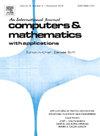Preconditioning techniques and parameterized regular splitting iteration methods for the Riesz distributed-order space-fractional diffusion equations with variable coefficients
IF 2.5
2区 数学
Q1 MATHEMATICS, APPLIED
引用次数: 0
Abstract
In this paper, we consider fast algorithm and parameterized regular splitting iteration methods for solving the distributed-order Riesz space fractional diffusion equations (DO-RSFDEs) with variable diffusion coefficients. We use the mid-point quadrature and shifted Grünwald and implicit finite difference (MPQ-SG-IFD) scheme to discretize the considered equation. The MPQ-SG-IFD scheme is unconditionally stable and has a global truncation error of . The preconditioned conjugate gradient (PCG) method with a symmetric and positive definite Toeplitz (SPDT) preconditioner is employed to solve the discretized linear system. The SPDT preconditioner can be viewed as a modification of the Toeplitz preconditioner proposed by Yang et al. (2023) [34]), but unlike the Toeplitz preconditioner, we prove that the spectrum of the preconditioned matrix is bounded above by positive constants independent of the temporal step size and the spatial grid size. In particular, the lower bound of the spectrum is equal to 1. For two-dimensional DO-RSFDEs, we present two classes of parameterized regular splitting (RS) iteration methods to solve the discretized linear system. The convergence of these two parameterized RS iterative methods is theoretically established. Numerical results are presented to demonstrate the effectiveness of our proposed methods.
变系数Riesz分布阶空间分数扩散方程的预处理技术及参数化正则分裂迭代方法
本文研究了具有变扩散系数的分布阶Riesz空间分数扩散方程的快速算法和参数化正则分裂迭代法。我们使用中点正交和移位grnwald和隐式有限差分(MPQ-SG-IFD)格式对考虑的方程进行离散化。MPQ-SG-IFD方案是无条件稳定的,其全局截断误差为0 (Δα2+h+τ)。采用对称正定Toeplitz (SPDT)预条件共轭梯度(PCG)法求解离散线性系统。SPDT预条件可以看作是Yang等人(2023)提出的Toeplitz预条件的改进,但与Toeplitz预条件不同的是,我们证明了预条件矩阵的谱由独立于时间步长和空间网格大小的正常数有界。特别地,谱的下界等于1。对于二维DO-RSFDEs,我们提出了两类参数化正则分裂(RS)迭代方法来求解离散线性系统。从理论上证明了这两种参数化RS迭代方法的收敛性。数值结果验证了所提方法的有效性。
本文章由计算机程序翻译,如有差异,请以英文原文为准。
求助全文
约1分钟内获得全文
求助全文
来源期刊

Computers & Mathematics with Applications
工程技术-计算机:跨学科应用
CiteScore
5.10
自引率
10.30%
发文量
396
审稿时长
9.9 weeks
期刊介绍:
Computers & Mathematics with Applications provides a medium of exchange for those engaged in fields contributing to building successful simulations for science and engineering using Partial Differential Equations (PDEs).
 求助内容:
求助内容: 应助结果提醒方式:
应助结果提醒方式:


